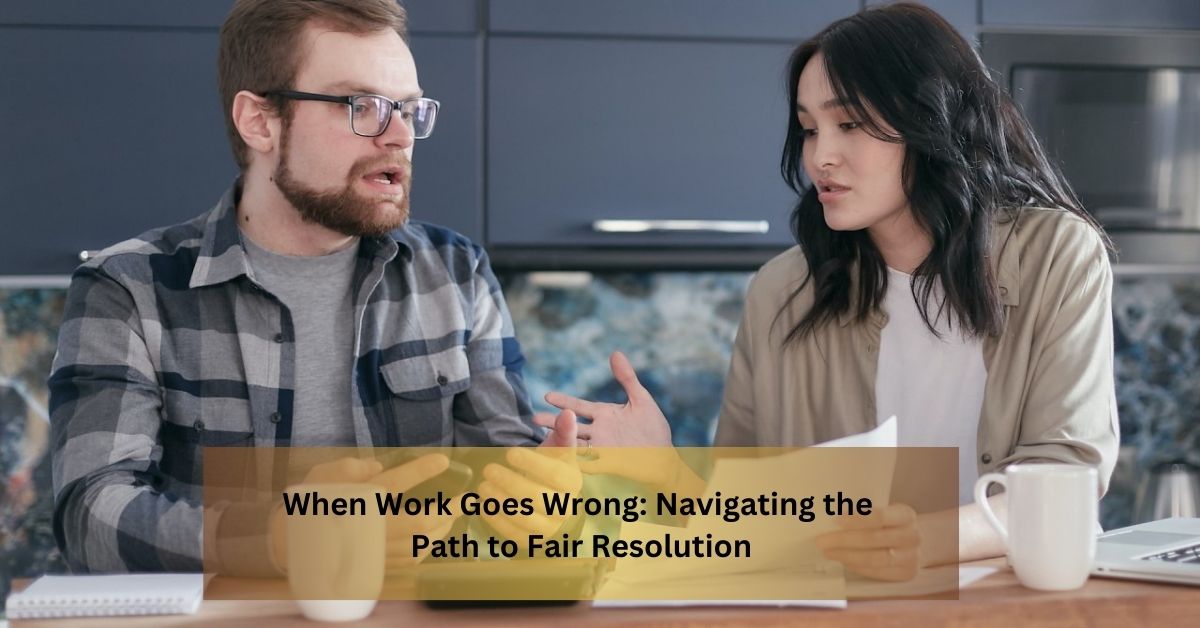In the intricate dance of the professional world, where ambitions soar and dreams are chased, the rhythm can sometimes falter. When work goes wrong, be it through misunderstandings, disputes, or unjust actions, the path to resolution can seem daunting.
Yet, it’s in these challenging moments that the strength of fairness and justice shines brightest, guiding us towards amicable solutions and equitable outcomes. Let’s embark on a journey to understand how individuals can navigate these turbulent waters, championing their rights while seeking a fair resolution.
Understanding the Landscape of Workplace Disputes
Workplace disputes can arise from a myriad of situations – from simple miscommunications to complex legal disagreements. Recognizing the nature of these disputes is the first step in addressing them effectively.
Whether it involves issues of compensation, working conditions, or interpersonal conflicts, each problem holds within it the seed of resolution, waiting to be nurtured by patience, understanding, and the right approach.
The Role of Dialogue and Mediation
Before the storm clouds gather too thickly, initiating a dialogue can often illuminate paths to resolution that were previously obscured.
Mediation, facilitated by a neutral third party, offers a structured environment where both sides can express their concerns and work towards a mutually beneficial outcome.
This process underscores the value of listening and compromise, principles that are often the first casualties in escalating conflicts.
When Legal Intervention Becomes Necessary
Despite the best efforts at dialogue and mediation, some disputes necessitate a more formal approach. This is particularly true in cases where an employee feels their dismissal was unjust, their rights infringed, or their professional reputation tarnished without cause. In such instances, seeking the guidance of an unfair dismissal employment lawyer can provide the clarity and direction needed to navigate the complex legal landscape of workplace disputes.
Unfair Dismissal: A Path to Justice
Unfair dismissal stands as one of the most contentious issues in employment law. It disrupts lives and can leave a lasting impact on one’s professional journey. However, with the expertise of an unfair dismissal employment lawyer, individuals find not just a champion for their cause but also a navigator who can guide them through the intricacies of employment law, ensuring that their case is heard and their grievances addressed with the seriousness they deserve.
Empowering Employees Through Knowledge
Knowledge is a beacon that cuts through the fog of uncertainty, empowering employees to stand up for their rights. Understanding the basics of employment law, the rights afforded to employees, and the responsibilities of employers is fundamental in preventing disputes and resolving them when they arise.
Resources and Support Systems
Numerous resources are available to employees seeking to understand their rights and the best course of action when disputes arise. From government websites offering clear guidelines on employment law to non-profit organizations providing counseling and support, these resources are invaluable allies in the quest for fair resolution.
The Importance of Documentation
In the realm of workplace disputes, documentation is king. Keeping detailed records of conversations, agreements, performance reviews, and any correspondence related to the dispute can provide crucial evidence should the matter escalate to formal proceedings. This meticulous approach not only strengthens one’s position but also encourages transparency and accountability from all parties involved.
Constructing a Clear Narrative
Documentation helps in constructing a clear, coherent narrative of events, highlighting the key issues at stake and the efforts made to resolve them. This narrative is crucial in legal settings, where clarity and precision are paramount, but it’s equally important in mediation and internal dispute resolution processes, where understanding and empathy can lead to amicable solutions.
The Role of Human Resources
Human Resources (HR) departments play a pivotal role in resolving workplace disputes. Acting as the bridge between employees and management, HR professionals can offer guidance, facilitate discussions, and ensure that company policies are applied fairly and consistently.
HR as Mediators and Educators
In their capacity as mediators, HR professionals can help de-escalate tensions and foster a constructive dialogue. Moreover, by educating both employees and management about their rights and obligations, HR can prevent many disputes from arising in the first place, promoting a culture of respect and mutual understanding within the organization.
The Journey Towards Resolution
Navigating the path to resolution in workplace disputes is a journey that requires patience, resilience, and a proactive approach. It’s about advocating for fairness while remaining open to compromise, about standing firm on principles while seeking common ground.
Fostering a Culture of Open Communication
Cultivating an environment where open communication is encouraged and valued is essential in preventing disputes and resolving them effectively when they do arise. In such a culture, issues can be addressed promptly, misunderstandings clarified, and solutions found before they escalate into more significant problems.
Seeking Win-Win Outcomes
The ultimate goal in resolving workplace disputes is not just to “win” but to find solutions that are beneficial for all parties involved. This win-win approach ensures that the resolution is sustainable, preserving professional relationships and contributing to a positive work environment.
When work goes wrong, the path to fair resolution is paved with knowledge, dialogue, and the courage to seek justice. Whether through the guiding hand of mediation, the strategic counsel of an unfair dismissal employment lawyer, or the proactive measures of HR departments, there are multiple avenues available to navigate these challenges.
By championing rights and fostering an environment of open communication and respect, employees and employers alike can turn disputes into opportunities for growth, understanding, and lasting resolution. In the end, it’s about ensuring that the workplace remains a space where fairness, respect, and dignity prevail, allowing everyone to reach their full potential.


